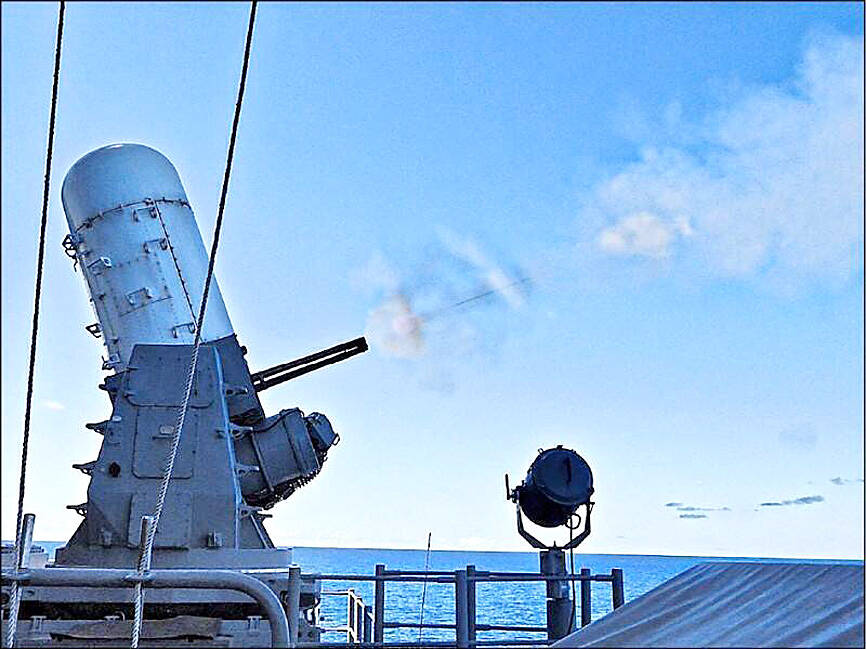The navy has installed 13 Phalanx Block 1B close-in weapons systems on its warships, increasing their defensive firepower, a defense official said on Saturday.
The systems cost the navy NT$10.16 billion (US$314.67 million), while eight additional Block 1A systems are being upgraded in the US and are expected to be delivered next year, the official said, speaking on condition of anonymity.
The Phalanx system used by Taiwan to defend its warships and key radar installations is a radar-cued gun system capable of firing 4,500 rounds a minute at targets as far away as 1.5km, the official said.

Photo: Screen grab from the navy’s Facebook page
With their superior range of engagement, rate of fire and a forward-looking infrared sensor, the Block 1B variant of the Phalanx system would boost navy ships’ defensive firepower against missiles, aircraft and small boats, he said.
The navy uses Phalanx systems to arm Keelung-class destroyers, Tuo Chiang-class frigates and Kang Ding-class frigates, among other warships that make up its fleet of principal surface combatants, he said.
The Yushan-class landing platform docks and the next-generation light frigates under construction would also be equipped with Phalanx systems, the official said.
Taiwanese warships typically have a point defense battery consisting of one or two Phalanx systems, he added.
The navy is to test the Sea Oryx Missile System, which was developed by the Chunghsan Institute of Science and Technology as a potential replacement for the Phalanx system, in live-fire exercises scheduled for later this month, he said.
The navy believes the US-made RIM-116 Rolling Airframe Missile or one of equivalent capability would be the best choice to use as point defense weapons on future warships, he added.

TRUST: The KMT said it respected the US’ timing and considerations, and hoped it would continue to honor its commitments to helping Taiwan bolster its defenses and deterrence US President Donald Trump is delaying a multibillion-dollar arms sale to Taiwan to ensure his visit to Beijing is successful, a New York Times report said. The weapons sales package has stalled in the US Department of State, the report said, citing US officials it did not identify. The White House has told agencies not to push forward ahead of Trump’s meeting with Chinese President Xi Jinping (習近平), it said. The two last month held a phone call to discuss trade and geopolitical flashpoints ahead of the summit. Xi raised the Taiwan issue and urged the US to handle arms sales to

A magnitude 5.6 earthquake struck off the coast of Yilan County at 12:37pm today, with clear shaking felt across much of northern Taiwan. There were no immediate reports of damage. The epicenter of the quake was 16.9km east-southeast of Yilan County Hall offshore at a depth of 66.8km, Central Weather Administration (CWA) data showed. The maximum intensity registered at a 4 in Yilan County’s Nanao Township (南澳) on Taiwan’s seven-tier scale. Other parts of Yilan, as well as certain areas of Hualien County, Taipei, New Taipei City, Taoyuan, Hsinchu County, Taichung and Miaoli County, recorded intensities of 3. Residents of Yilan County and Taipei received

Taiwan has secured another breakthrough in fruit exports, with jujubes, dragon fruit and lychees approved for shipment to the EU, the Ministry of Agriculture said yesterday. The Animal and Plant Health Inspection Agency on Thursday received formal notification of the approval from the EU, the ministry said, adding that the decision was expected to expand Taiwanese fruit producers’ access to high-end European markets. Taiwan exported 126 tonnes of lychees last year, valued at US$1.48 million, with Japan accounting for 102 tonnes. Other export destinations included New Zealand, Hong Kong, the US and Australia, ministry data showed. Jujube exports totaled 103 tonnes, valued at

BIG SPENDERS: Foreign investors bought the most Taiwan equities since 2005, signaling confidence that an AI boom would continue to benefit chipmakers Taiwan Semiconductor Manufacturing Co’s (TSMC, 台積電) market capitalization swelled to US$2 trillion for the first time following a 4.25 percent rally in its American depositary receipts (ADR) overnight, putting the world’s biggest contract chipmaker sixth on the list of the world’s biggest companies by market capitalization, just behind Amazon.com Inc. The site CompaniesMarketcap.com ranked TSMC ahead of Saudi Aramco and Meta Platforms Inc. The Taiwanese company’s ADRs on Tuesday surged to US$385.75 on the New York Stock Exchange, as strong demand for artificial intelligence (AI) applications led to chip supply constraints and boost revenue growth to record-breaking levels. Each TSMC ADR represents